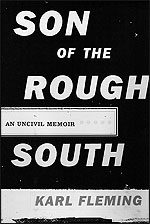In a way, Karl Fleming has two birthdays: The first is August 30, 1927, when one Nettie Fleming gave birth to a blond-haired, blue-eyed baby boy at a hospital in Newport News, Virginia. The second is December 27, 1935, when the same woman delivered him to the Methodist Episcopal Orphanage in Raleigh, North Carolina, where at the age of eight he began a new life. It would take him a lifetime to recover from the trauma of both events, and his mother would go to her grave without receiving his forgiveness.
Her first husband and Karl’s father, David Henry Fleming, was a hard-drinking son of a tobacco farmer who eked out a living selling life insurance policies to farmers in the South where the Great Depression arrived early. He died six months after Karl was born. The insurance salesman didn’t have a policy of his own. Nettie tried selling dishes and bibles door to door, with no success, and later reluctantly married her dead husband’s best friend, McDuff Laughinghouse, another insurance salesman. Ethel, their daughter, was born on August 29, 1931 in Mauls Swamp, North Carolina, where they lived in a shotgun shack (you could fire a shot in the front door and it would exit the back without hitting anything), owned by the Laughinghouse family. Within a few years her second husband died. Twice widowed and unable to work, Nettie Fleming felt that she had no choice but to place her two young children in an institution where they would, at least, receive the essentials of life, but have to learn to fend for themselves. She would never live in the little house with the white picket fence that she hoped to share with her children.
Ethel Laughinghouse was admitted to an all-girl orphanage in September 1935. She was only four. Karl followed four months later. At the age of eight, with the nickname, “pretty boy,” Karl entered what seemed at the time like a personal hell. In time it would prove to be his salvation. While the source of many lifelong pains, the orphanage provided Fleming with family-like ties among both the staff and the other students there. He developed a work ethic that formed the foundation of a personal ethos that would sustain him throughout his life. He learned to outsmart the bullies. And as an underdog, he developed compassion for other underdogs.
His Journey as a Reporter
“Son of the Rough South, an Uncivil Memoir” at times reads like fiction and shares many of the qualities of the great books written by Dickens, Twain and Dostoyevsky, where both character and place are shaped by social and historic events. “Human growth does not proceed in a straight line,” Goethe teaches George Webber in Thomas Wolfe’s American classic “You Can’t Go Home Again,” and Fleming’s book, leaving nothing to the imagination, traces a zigzag course over the tattered life of its author. As in a 12-step program, he bares all the hidden hurts, assaults against his character, and unrequited expectations.
Being sexually molested by a group of boys when he was young is an encounter he shares in jarring detail, as if he feels the need to cleanse himself of the experience. Fleming has learned along the way that “secrets make you sick.” Again and again we are reminded—through the eyes of both the child and the man—of his mother’s failings, both as a parent and a person.
But for the aspiring journalist, Fleming’s book could be used as a primer on how to become a good reporter. From his early years at the orphanage we see him evolving into a person who desires to expand his world. The library becomes both a refuge and a repository of ideas and examples of life’s vagaries. Beyond the orphanage, when he enters the military at the age of 17, and later as a young reporter for a paper in Wilson, North Carolina, he learns from both the skilled and the scum. Riding with a local cop who is both a bigot and a bully, he witnessed firsthand the suffering, degradation and murder of blacks in the South, his South.
From one of his first editors, he’s taught that both blacks and whites, the living and the dead, deserve the same respect. He also notes that while his mother failed to take responsibility for her problems, she treated all people as equals and never spoke ill of black people. He learned the newspaper business from the bottom to the top, at times because other reporters or editors didn’t carry their share of the workload. His willingness to see the job through, without complaining—something he learned at the orphanage—proved to be a lifesaver. He moved up the ladder, trading up to better jobs in bigger cities. By the time he reached Atlanta, married with two children and where he worked briefly as a magazine writer for The Atlanta Constitution, he came to the attention of Newsweek magazine and began covering the unfolding of the greatest story of the 20th century: the civil rights movement.
At Newsweek he received the nurturing in both body and spirit that he found lacking in his earlier years. In this environment, he flourished. All that he had done and suffered up to that point prepared him for this moment. Under the tutelage of Bill Emerson, a senior editor at the magazine, he learned how to write a magazine story. The great writers he’d discovered in the library at the orphanage became midwives to his talent.
Over time, Fleming learned that the hate that poisoned his South lives within us all. Keeping that hate at bay is our struggle. The rest of his story is up to the reader to discover, but I will add this note: Fleming’s coverage of the civil rights movement ranked among the best out there. Under his byline appeared many of the great names and moments of that historic struggle. And though his mother never got to live in the little house with the white picket fence that he now shares with his wife, Anne, and their dog, Dixon, she lived to see her “little man” live out her dream.
Lester Sloan, a 1976 Nieman Fellow, is a freelance photojournalist.
Her first husband and Karl’s father, David Henry Fleming, was a hard-drinking son of a tobacco farmer who eked out a living selling life insurance policies to farmers in the South where the Great Depression arrived early. He died six months after Karl was born. The insurance salesman didn’t have a policy of his own. Nettie tried selling dishes and bibles door to door, with no success, and later reluctantly married her dead husband’s best friend, McDuff Laughinghouse, another insurance salesman. Ethel, their daughter, was born on August 29, 1931 in Mauls Swamp, North Carolina, where they lived in a shotgun shack (you could fire a shot in the front door and it would exit the back without hitting anything), owned by the Laughinghouse family. Within a few years her second husband died. Twice widowed and unable to work, Nettie Fleming felt that she had no choice but to place her two young children in an institution where they would, at least, receive the essentials of life, but have to learn to fend for themselves. She would never live in the little house with the white picket fence that she hoped to share with her children.
Ethel Laughinghouse was admitted to an all-girl orphanage in September 1935. She was only four. Karl followed four months later. At the age of eight, with the nickname, “pretty boy,” Karl entered what seemed at the time like a personal hell. In time it would prove to be his salvation. While the source of many lifelong pains, the orphanage provided Fleming with family-like ties among both the staff and the other students there. He developed a work ethic that formed the foundation of a personal ethos that would sustain him throughout his life. He learned to outsmart the bullies. And as an underdog, he developed compassion for other underdogs.
His Journey as a Reporter
“Son of the Rough South, an Uncivil Memoir” at times reads like fiction and shares many of the qualities of the great books written by Dickens, Twain and Dostoyevsky, where both character and place are shaped by social and historic events. “Human growth does not proceed in a straight line,” Goethe teaches George Webber in Thomas Wolfe’s American classic “You Can’t Go Home Again,” and Fleming’s book, leaving nothing to the imagination, traces a zigzag course over the tattered life of its author. As in a 12-step program, he bares all the hidden hurts, assaults against his character, and unrequited expectations.
Being sexually molested by a group of boys when he was young is an encounter he shares in jarring detail, as if he feels the need to cleanse himself of the experience. Fleming has learned along the way that “secrets make you sick.” Again and again we are reminded—through the eyes of both the child and the man—of his mother’s failings, both as a parent and a person.
But for the aspiring journalist, Fleming’s book could be used as a primer on how to become a good reporter. From his early years at the orphanage we see him evolving into a person who desires to expand his world. The library becomes both a refuge and a repository of ideas and examples of life’s vagaries. Beyond the orphanage, when he enters the military at the age of 17, and later as a young reporter for a paper in Wilson, North Carolina, he learns from both the skilled and the scum. Riding with a local cop who is both a bigot and a bully, he witnessed firsthand the suffering, degradation and murder of blacks in the South, his South.
From one of his first editors, he’s taught that both blacks and whites, the living and the dead, deserve the same respect. He also notes that while his mother failed to take responsibility for her problems, she treated all people as equals and never spoke ill of black people. He learned the newspaper business from the bottom to the top, at times because other reporters or editors didn’t carry their share of the workload. His willingness to see the job through, without complaining—something he learned at the orphanage—proved to be a lifesaver. He moved up the ladder, trading up to better jobs in bigger cities. By the time he reached Atlanta, married with two children and where he worked briefly as a magazine writer for The Atlanta Constitution, he came to the attention of Newsweek magazine and began covering the unfolding of the greatest story of the 20th century: the civil rights movement.
At Newsweek he received the nurturing in both body and spirit that he found lacking in his earlier years. In this environment, he flourished. All that he had done and suffered up to that point prepared him for this moment. Under the tutelage of Bill Emerson, a senior editor at the magazine, he learned how to write a magazine story. The great writers he’d discovered in the library at the orphanage became midwives to his talent.
Over time, Fleming learned that the hate that poisoned his South lives within us all. Keeping that hate at bay is our struggle. The rest of his story is up to the reader to discover, but I will add this note: Fleming’s coverage of the civil rights movement ranked among the best out there. Under his byline appeared many of the great names and moments of that historic struggle. And though his mother never got to live in the little house with the white picket fence that he now shares with his wife, Anne, and their dog, Dixon, she lived to see her “little man” live out her dream.
Lester Sloan, a 1976 Nieman Fellow, is a freelance photojournalist.




